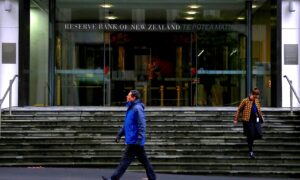The New Zealand Reserve Bank (RBNZ) has delivered its largest official cash rate (OCR) hike of 75 basis points to 4.25 percent, after figures revealed inflation remained stubbornly high.
Across 16 months, the RBNZ has raised the OCR by 400 basis points (bp) over nine consecutive hikes.
The OCR currently sits at the highest level since 2009 and is expected to peak at 5.5 percent in the latter half of 2023.
The Reserve Bank committee noted that a full 100 basis point hike had also been considered.
“Members agreed that a larger increase in the OCR was appropriate, given the resilience of domestic spending, and the higher and more persistent actual and expected inflation outcomes,” the committee said.
Stats NZ revealed that inflation during the September quarter eased from 7.3 to 7.2 percent, far surpassing the forecasts of 6.5 percent and shattering expectations that inflation was returning to normal.
In the monetary statement policy (pdf), the RBNZ revealed the economy is expected to enter a recession in 2023.
“This economic contraction will, in part, be a result of higher interest rates, as the Reserve Bank acts to reduce inflation and return employment to a more sustainable level,” it said.
“Any fiscal or monetary policy actions that try to offset this [contraction] with further stimulus will ultimately lead to a longer period of high inflation.
“The peak to trough decline in the level of GDP is expected to be about one percent.”
Very ‘Hawkish’ Statement
ANZ Chief Economist Sharon Zollner said the 0.75 percent increase was widely anticipated, but the tone of the statement had been “even more hawkish” than expected.
“The big surprise was in the forecast track, which now sees the OCR reaching a hefty 5.5 percent by end-2023 (a remarkable 140 bp higher than in the August monetary policy statement),” she said.
“The 140 bp upward revision to the forecast OCR peak is massive, but so too have been the upside surprises to inflation, inflation expectations, and the wage outlook in recent months.”
ASB Bank Chief Economist Nick Tuffley said the RBNZ was demonstrating “clear urgency” in its hawkish statement, but had some time to assess the situation before the next decision.
“There is three months of time to pass until the next decision, and the data flow will give a steer on whether continued urgency will remain appropriate in February,” he said in a note (pdf).
Both economists are expecting another 75 bp hike in February, followed by a 50 bp in May.
Kelvin Davidson, chief economist of property researcher CoreLogic, said with another 0.75 percent interest rate increase in February, it was likely that fixed mortgage rates will start pushing past 7 percent.
“After some ‘green shoots of optimism’ had started to emerge through the first half of October, the stubborn inflation reading for Q3 and expected higher peak for the OCR (and mortgage rates) have in some ways pushed us into ‘phase two’ of the current property market downturn,” he said.
House prices have fallen 11 percent since the November 2021 peak and this decline is expected to continue.

